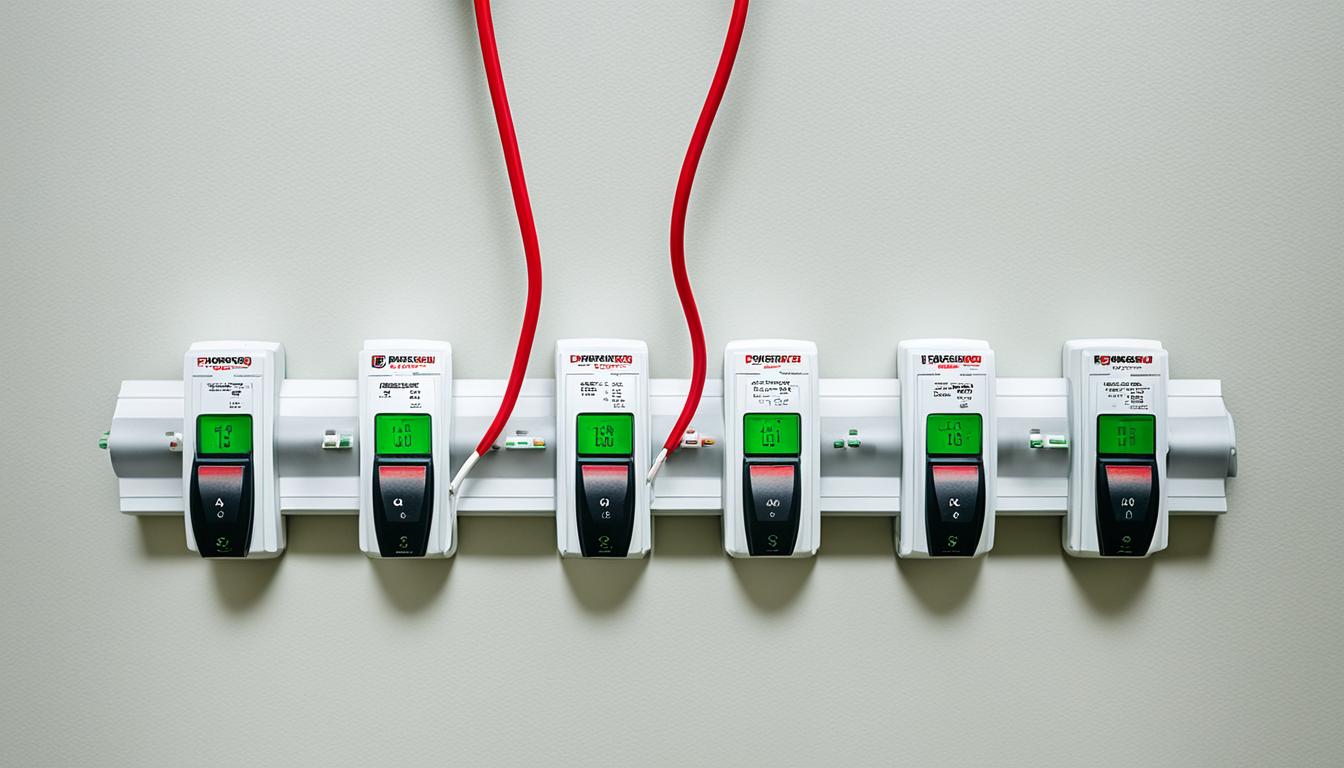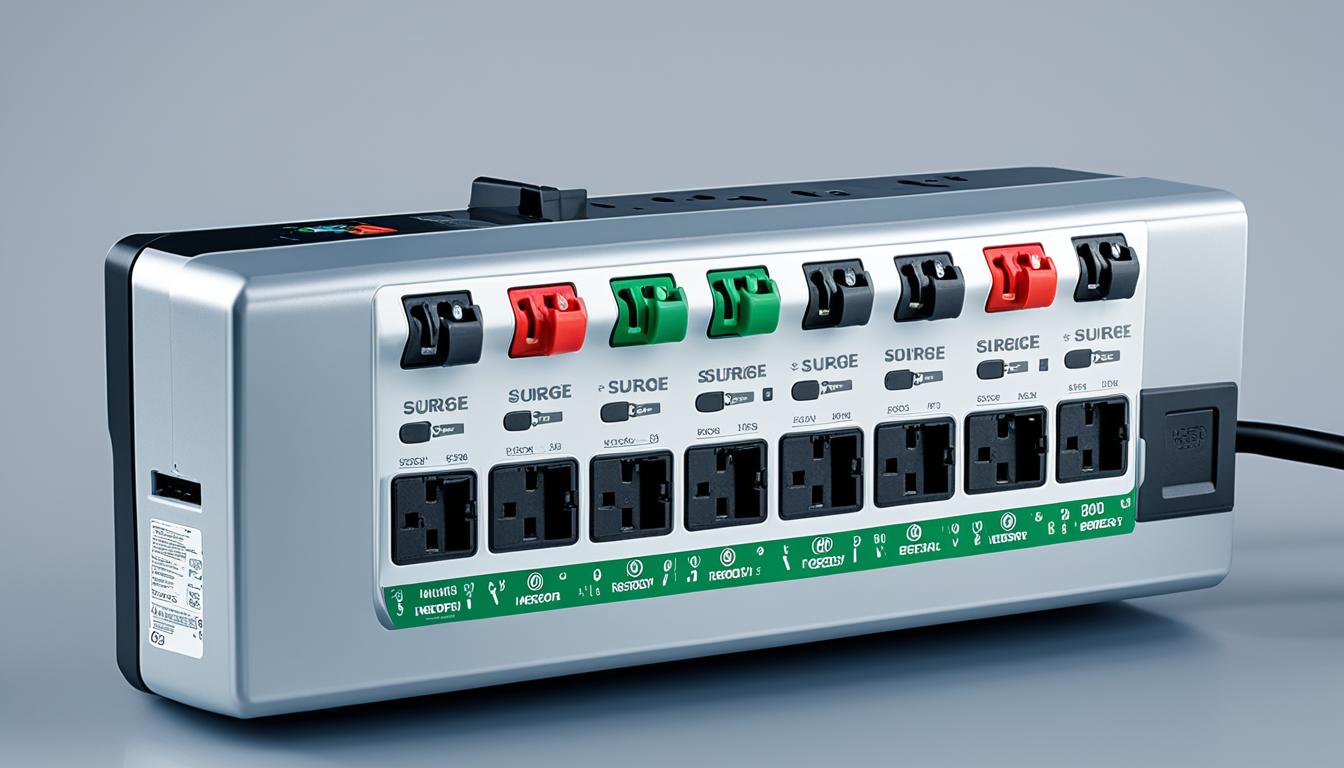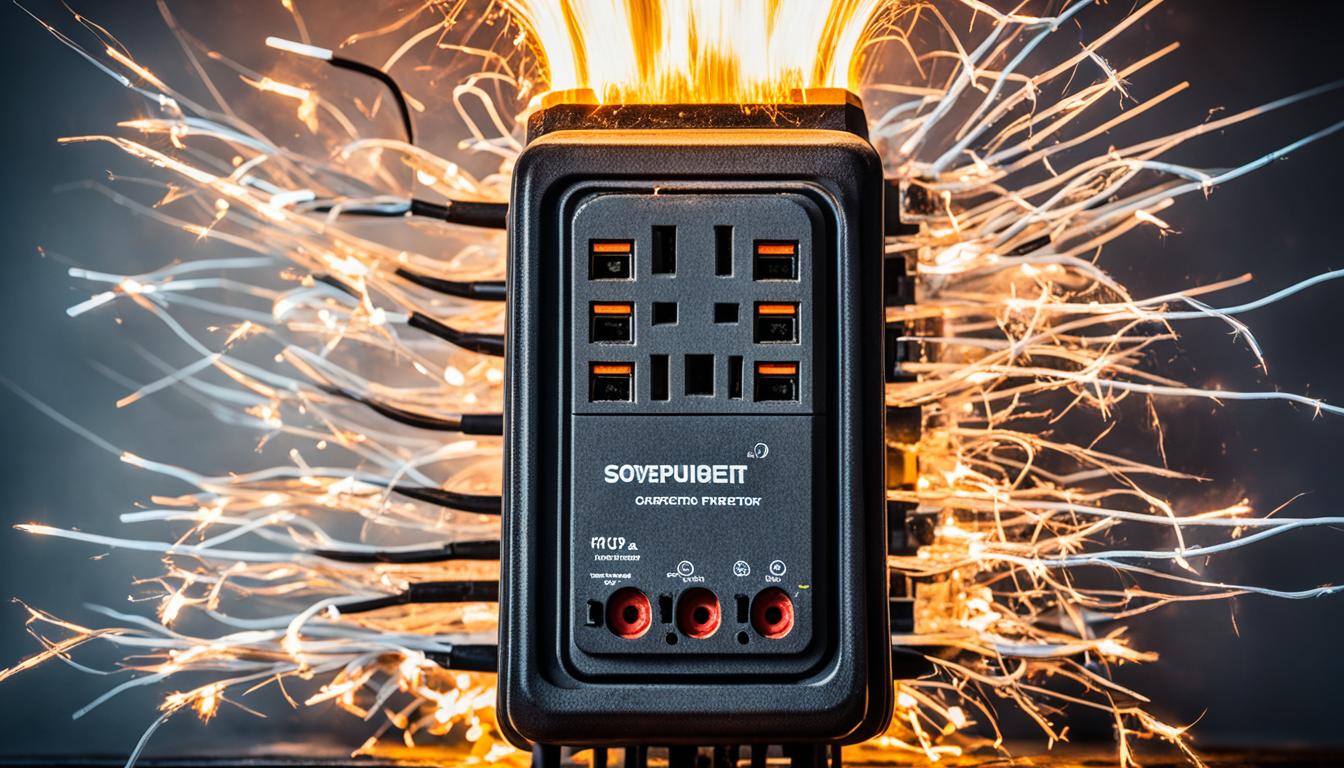When it comes to using extension cords with microwaves, safety should always be a top priority. While it is generally recommended to avoid using an extension cord with a microwave, there are certain circumstances where it may be necessary. In this article, we will discuss the safe options for microwave extension cords and the considerations to keep in mind.
Key Takeaways:
- Using an extension cord with a microwave is not recommended, but it can be done in certain situations.
- If you choose to use an extension cord, select a three-wire grounding type appliance cord with UL approval and a current rating equal to or greater than the microwave’s electrical rating.
- It is best to use heavy-duty extension cords labeled as “appliance power cords” or “major appliance power cords.”
- Consider the length and gauge of the extension cord to ensure it can handle the microwave’s electrical requirements.
- Always prioritize safety and regularly inspect the extension cord for any signs of damage.
What Extension Cords Work Best With Microwaves?
When using an extension cord with a microwave, it is important to choose the right type of cord to ensure safety and proper functionality. Here are some key factors to consider:
- Type of Cord: The extension cord should be a three-wire grounding type appliance cord with Underwriters Laboratory (UL) approval. This type of cord helps to prevent electrical hazards and ensures a reliable connection between the microwave and the power source.
- Current Rating: The extension cord should have a current rating that is equal to or greater than the microwave’s electrical rating. Check the microwave’s user manual or the label on the appliance for the electrical rating, and choose an extension cord with a matching or higher current rating.
- Heavy-Duty Cords: Heavy-duty extension cords specifically labeled as “appliance power cords” or “major appliance power cords” are designed to handle the power demands of high-consumption appliances like microwaves. These cords are constructed with thicker conductors and are more suitable for use with microwaves.
- Gauge of the Cord: The gauge of the extension cord refers to the thickness of its wires. A lower gauge number indicates thicker wires, which can handle higher power loads. It is recommended to use at least a 12-gauge extension cord for microwaves with a wattage of up to 1000 watts.
By selecting the right extension cord that meets these criteria, you can ensure a safe and convenient power connection for your microwave.
Benefits of Using the Right Extension Cord for Your Microwave:
“Using the appropriate extension cord for your microwave not only ensures safety but also helps maintain optimal performance and functionality of the appliance. By having the right cord with the proper current rating and gauge, you can avoid potential electrical issues and reduce the risk of damage to your microwave.” – James Anderson, Home Appliance Expert
Now that you know what extension cords work best with microwaves, let’s explore why it’s generally recommended to avoid plugging microwaves into extension cords in the next section.
| Extension Cord Type | Features | Advantages |
|---|---|---|
| Three-wire grounding appliance cord | UL approved, durable construction | Prevents electrical hazards, reliable connection |
| Heavy-duty appliance power cord | Thicker conductors, designed for high-consumption appliances | Handles power demands, suitable for microwaves |
Reasons You Shouldn’t Plug a Microwave Into an Extension Cord
Plugging a microwave into an extension cord can pose serious safety risks. While it may seem convenient, extension cords are not designed to handle the high current draw of a microwave. This can lead to several issues:
- Cord damage: Microwaves typically require a considerable amount of power, and extension cords may not be able to handle the load. Over time, this can cause the cord to overheat, melt, or become damaged, posing a significant fire hazard.
- Tripped breakers: The high power consumption of microwaves can cause circuit breakers to trip. This can disrupt power to other appliances or areas of your home, inconveniencing you and potentially damaging electronic devices.
- Fire hazards: Extension cords are not designed to handle continuous high-power usage. The increased current draw from a microwave can generate excessive heat in the cord, potentially leading to electric sparks or fires.
Considering these risks, it is generally recommended to avoid using an extension cord with a microwave. Instead, it is safer to connect your microwave directly to a properly grounded, dedicated electrical outlet. This eliminates potential hazards and ensures a reliable power source for your microwave.
Quote:
“Using an extension cord to power a microwave is risky and can compromise your safety. It’s best to adhere to the manufacturer’s guidelines and always plug your microwave into an appropriate electrical outlet.” –
Simon Johnson, Electrical Safety Expert
| Issue | Risks |
|---|---|
| Cord damage: | Risk of fire due to cord overheating or melting |
| Tripped breakers: | Disruption of power to other appliances or areas |
| Fire hazards: | Potential electric sparks or fires due to improper power consumption |
To ensure the safety of your home and loved ones, it is important to follow proper electrical guidelines and avoid using extension cords to power microwaves. By using a dedicated electrical outlet, you can enjoy the convenience of your microwave without compromising safety.
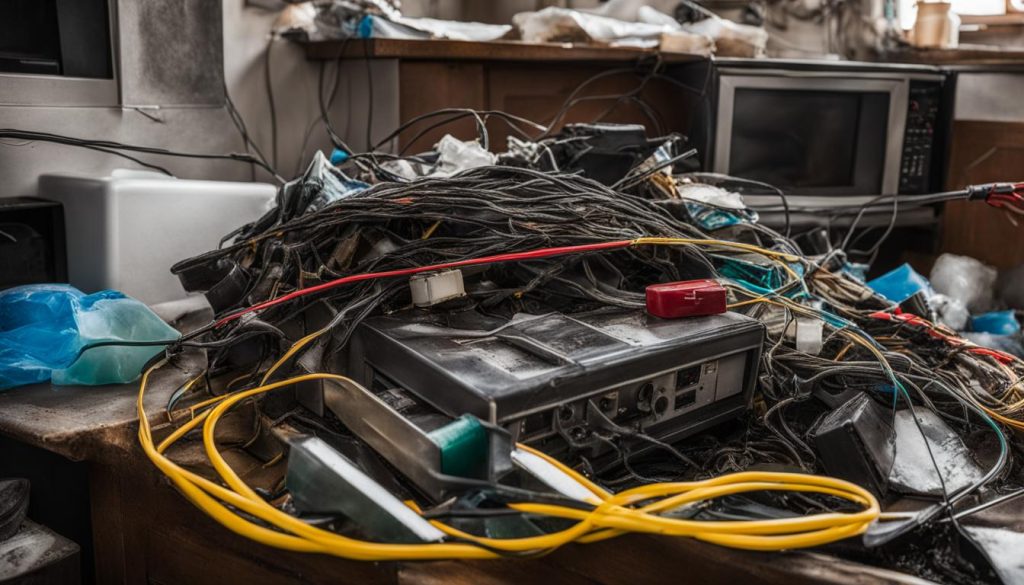
What to Consider if You Want to Plug a Microwave Into an Extension Cord
If you still choose to plug a microwave into an extension cord, there are some factors to consider. Follow these guidelines to ensure safe and efficient usage of your microwave extension cord.
Keep the Length Short
It is important to keep the length of the extension cord as short as possible to minimize voltage drop and resistance. Ideally, the extension cord should be less than 25 feet in length, but no more than 50 feet.
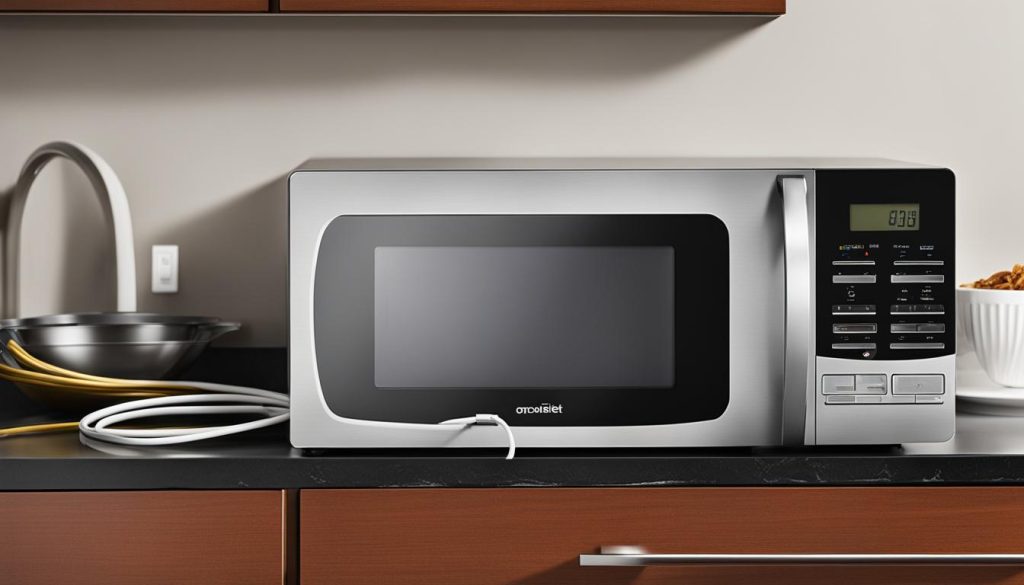
Select the Right Gauge
When choosing an extension cord for your microwave, select one that can handle the microwave’s electrical requirements. Look for a cord with a gauge suitable for your microwave’s wattage. For microwaves with up to 1000 watts, a 12-gauge extension cord should be used. Using the correct gauge ensures that the cord can safely carry the necessary current.
Be Cautious of Misleading Information
Be cautious of extension cord manufacturers who may not provide accurate information about the cord’s gauge and amp rating. Some cords may claim to be suitable for high-power appliances like microwaves, but may not actually meet the required standards. It is important to do your research and purchase extension cords from reputable brands to ensure safety.
Inspect the Cord for Damage
Always inspect the extension cord for any signs of damage before use. Look for frayed wires, exposed conductors, or any other visible issues. Using a damaged cord can pose serious safety hazards and should be avoided.
By considering these factors, you can minimize the risks associated with using an extension cord for your microwave. However, it is important to note that the use of an extension cord with a microwave is not recommended and should only be done as a temporary solution. It is always best to use a properly grounded, dedicated electrical outlet for your microwave to ensure safe and reliable power.
Conclusion
While it is technically allowed to plug a microwave into an extension cord, it is not recommended and should only be done as a temporary solution. The U.S. Fire Department discourages the use of extension cords with microwaves due to safety concerns. Using a properly grounded, dedicated electrical outlet is the best option for ensuring safe and reliable power for your microwave. If an extension cord must be used, follow the guidelines mentioned above and prioritize safety at all times.
Plugging your microwave into an extension cord can increase the risk of electrical issues, cord damage, or even fires. Extension cords are not designed to handle the high current draw of a microwave, which can lead to overheating and potential hazards. To protect yourself and your home, it is advisable to avoid using an extension cord with your microwave altogether.
Instead, consider installing a dedicated electrical outlet near your microwave to eliminate the need for an extension cord. This ensures a direct and stable power supply, reducing the chances of electrical problems. If you have an existing outlet that is not easily accessible, hiring a licensed electrician to extend the outlet closer to your microwave is a safe and reliable solution.
Remember, safety should always come first. By following the recommended guidelines and making the appropriate electrical arrangements, you can enjoy the convenience of your microwave without compromising the well-being of your household.
FAQ
Can I use an extension cord with my microwave?
While it is technically allowed to plug a microwave into an extension cord, it is not recommended for safety reasons. Microwaves should be plugged into their own properly grounded, dedicated electrical outlets to prevent electrical issues and potential hazards.
What type of extension cord should I use with my microwave?
If you choose to use an extension cord with your microwave, it is important to select a three-wire grounding type appliance cord that is approved by Underwriters Laboratory (UL) and has a current rating equal to or greater than your microwave’s electrical rating. Heavy-duty extension cords labeled as “appliance power cords” or “major appliance power cords” are suitable for use with microwaves.
Can plugging a microwave into an extension cord be dangerous?
Yes, plugging a microwave into an extension cord can pose safety risks. Extension cords are designed for lower-power devices and may not be able to handle the high current draw of a microwave. This can lead to issues such as cord damage, tripped breakers, or even fires. It is generally recommended to avoid using an extension cord with a microwave and instead use a properly grounded, dedicated electrical outlet.
What factors should I consider if I still want to use an extension cord with my microwave?
If you still choose to use an extension cord with your microwave, consider the length of the cord. Keep it as short as possible, ideally less than 25 feet but no more than 50 feet, to minimize voltage drop and resistance. Select an extension cord with a gauge that can handle your microwave’s electrical requirements, such as a 12-gauge cord for microwaves with up to 1000 watts. Always inspect the cord for any signs of damage before use.
What is the safest option for powering my microwave?
The safest option for powering your microwave is to use a properly grounded, dedicated electrical outlet. This helps ensure safe and reliable power without the potential hazards associated with using an extension cord.
